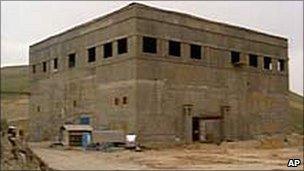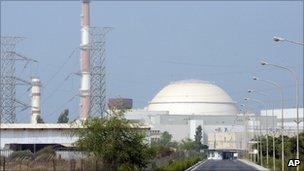IAEA nuclear watchdog meeting to focus on Syria
- Published

Israel bombed the remote desert site of the alleged reactor in September 2007
The International Atomic Energy Agency board is meeting amid pressure from the US and other nations to rebuke Syria over alleged illicit nuclear activity.
The latest IAEA report concluded that a Syrian site destroyed in a 2007 raid was probably a nuclear reactor.
Syria insists that it was a non-nuclear, military site.
The US and other Western allies have been pushing for Damascus to be reported to the UN Security Council, but several countries oppose the move.
Israel bombed the desert site of the alleged reactor - near Deir Alzour in the country's remote north-east - in September 2007.
Safeguards agreement
The 35-member board of IAEA governors is holding a week-long meeting at its headquarters in Vienna.
In his introductory statement to the board, Yukiya Amano, the director general, said Syria had failed to cooperate fully on Deir Alzour, despite being given "ample time".
However, he said the Atomic Energy Commission of Syria had sent a letter and discussions would continue.

The issue of Iran's nuclear programme will also be high on the agenda
Mr Amano also said the destruction of the site "allegedly by Israel" was "deeply regrettable".
"Rather than force being used, the case should have been reported to the IAEA," he said.
The BBC's Bethany Bell, in the Austrian capital, says there is a growing sense of frustration about the situation in Syria among some diplomats, who say they have been pushing to get access to certain sites for the past three years.
However, she says other diplomats who are reluctant to adopt a resolution say that Syria has offered more cooperation and that, given the current uprising in the country, it might not be the right moment to apply more pressure.
Syria is a signatory to the Nuclear Non-Proliferation Treaty (NPT), which gives it the right to enrich its own fuel for civil nuclear power, under inspection from the IAEA.
But it has also signed a safeguards agreement with the IAEA under which it is obliged to notify the UN's nuclear watchdog of any plans to construct a new nuclear facility.
Western diplomats say they believe there is sufficient support for a resolution on Syria to be carried, albeit without unanimous backing.
The issue of Iran's nuclear programme will again be high on the agenda.
The latest IAEA report says Tehran is continuing to defy UN sanctions by stockpiling low-enriched uranium.
Mr Amano's remarks on Monday said the IAEA had also received "further information related to possible past or current undisclosed nuclear-related activities that seem to point to the existence of possible military dimensions to Iran's nuclear programme".
He added: "There are indications that certain of these activities may have continued until recently."